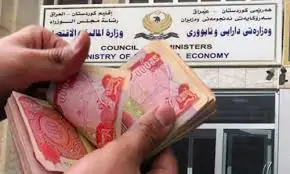Iraq faces essential economic demanding situations in light of the escalation of the earnings disaster among the federal authorities and the Kurdistan place, because the parties exchanged accusations concerning monetary responsibilities and the finances distribution mechanism.
while Baghdad is making an attempt to cozy salaries amid monetary challenges, the regional government is accused of advertising and marketing its problems and blaming the federal authorities for the monetary deficit, which further complicates the political and monetary scene within the united states.
Member of the Parliamentary Finance Committee, Moeen Al-Kadhimi, showed : “Iraq goes through a financial crisis that calls for a experience of duty,” stressing “the want for the area to commit to delivering 400,000 barrels of oil in line with day to Baghdad,” noting that “the area has no longer delivered four trillion dinars in non-oil revenues,” accusing the regional authorities of “smuggling heaps of oil tankers overseas day by day.”
Al-Kadhimi defined that “the suspension of oil exports via the Turkish port of Ceyhan, that is stated to price Iraq $25 million per day, is inaccurate, as the share of southern oil was compensated according to OPEC agreements.
He brought that “the federal authorities is severe about resolving the region’s oil report,” noting that “the Ministry of Finance issued a statement with figures on the salaries granted to the area.”
Al-Kadhimi criticized the statements of the top of the nearby government, Masrour Barzani, describing them as “impulsive”, compared to the more rational policy of Nechirvan Barzani, stressing that “the Ministry of Finance works professionally, a ways from political calculations,” stressing “the want to put into effect economic procedures fairly.”
He mentioned that “the regional government’s mismanagement has hindered the disbursement of personnel’ salaries for December 2024, no matter their shipping via the federal authorities,” calling on “parliament individuals to recognize the importance of resuming the export of the vicinity’s oil via the port of Ceyhan, because it will supply the federal government complete jurisdiction over Iraqi oil, regardless of the excessive extraction prices in comparison to southern oil.”
Al-Kadhimi concluded with the aid of stressing “the need to pay the salaries of all of the Kurdistan local authorities’s personnel, such as social welfare, while adhering to economic contexts that make sure justice amongst all governorates.
The top Minister of the Kurdistan nearby authorities, Masrour Barzani, attacked Baghdad’s coverage, which he said had succeeded in lowering the region’s troubles to the difficulty of salaries only, noting that this policy had distracted every body from many different important issues that wished solutions.
Barzani stated, “The manner Baghdad deals with the area is not a federal deal, and does not replicate the spirit of federalism, and this deal is not even suitable for an Iraqi governorate.”
meanwhile, MP Sarwa Abdul Wahid, in a announcement the day prior to this, held the ruling parties liable for cutting personnel’ salaries due to the failure to go back oil and non-oil sales to the state treasury. in line with her,
for her component, Finance Minister Taif Sami introduced the whole funding of the location’s employees’ salaries for the yr 2024.
Sami stated, for the duration of her website hosting inside the Parliamentary Finance Committee, that “the federal government paid more than 11 trillion in salaries to the Kurdistan area’s employees, and the government in Kurdistan did now not quit the location’s oil and non-oil sales to the center.”
Sami explained that the place’s non-oil revenues amounted to greater than four trillion dinars, and Erbil most effective despatched 320 billion dinars to Baghdad. We funded all of the salaries of the vicinity’s personnel for the year 2024 and aren’t accountable for not delivering them to their beneficiaries.





